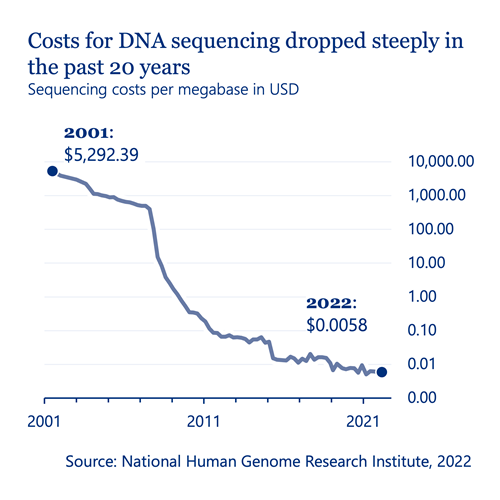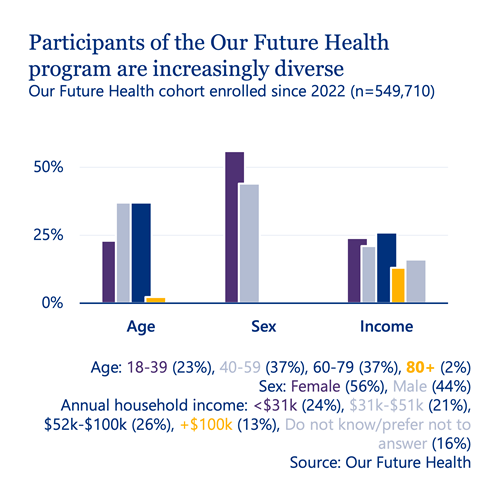In the 20 years since the landmark Human Genome Project was completed, progress in applying that knowledge to treating disease has been slower than initial hype suggested. Is genomics now coming of age?
Genetics didn't start until the 1850s and 1860s with Darwin and Mendel. It took another 100 years before Crick and Watson elucidated DNA, and 50 years more before we got the first human genome. But then in the last 20 years or so, an awful lot has happened. It may have been a little less than some of the visionaries from 2000 were saying, but whether it's treatments or vaccines or surveillance or diagnostics, genetics is now everywhere you look.
Digital and sequencing technology has set the pace – and that is accelerating. Huge advances in automated “sequencing by synthesis” (the approach pioneered by Fred Sanger in the 1970s) have powered progress in the last 20 years. A new generation of “nanopore-based sequencing” (which measures DNA electronically, rather than the optical Sanger approach) is likely to be a big further enabler for all sorts of additional applications because it dramatically improves the richness and speed of what you can do, and enables sequencing to be done in many more settings.
Within healthcare, cancer is clearly the biggest application, underpinned by an explosion in ways to analyze tumors, including progress with liquid biopsies. After oncology, anti-infectives is another major opportunity – for example, the ability to rapidly differentiate between different strains of tuberculosis. And beyond that, there are a host of possibilities involving things like tissue matching and neonatal care.
In the long term, if we can get a deeper understanding of disease by creating an incredibly detailed picture of the nation’s health through Our Future Health, then we should all be healthier as a result.
What are the challenges of getting the general public on board with a huge project like Our Future Health?
At the heart of it is a communications challenge because we need 5 million people to sign up and we need to keep those people engaged. Part of that is about communicating the promise of population-scale genomics, without falling into hype.
At the individual level, we are offering blood pressure and cholesterol readings upfront, along with the promise of further feedback on disease risk down the track. However, we need to manage expectations as to exactly what that feedback will be, when people will get it and what they can do with it. There’s a balance to be struck between exciting people sufficiently that they want to take part, without raising false expectations.
The opportunity to receive blood pressure and cholesterol readings has proved to be a powerful driver of engagement. Interestingly, over 25% of the people we’ve had through have got high blood pressure, as defined by the NHS, and over half have raised cholesterol.
We recognize that more needs to be done to get us to 5 million and we are exploring options for how we can remove barriers to participation. We have been piloting a £10 ($12.4) voucher in some areas to enable participation for people for whom costs may prevent them from taking part. We also have the possibility of offering ancestry data further down the line.
You have committed to building a resource that truly reflects the UK population. How do you get a sufficiently diverse participation across ethnic, economic, age and geographic groupings to achieve that aim?

Until six months ago, there was some concern about hitting our target rate of recruitment, but now the tide has turned. Broad participation is rolling in fine – we were delighted recently to announce that we’ve signed up our millionth volunteer, just over a year after starting our recruitment drive. And the team has put a great deal of thought and effort into ensuring that our recruitment reflects the diversity of the UK population – and this too is going well, although we are still a little light on the lowest 10% of affluence and 18- to 25-year-olds. Locating our mobile clinics in places that are as accessible as possible to communities that are likely to be difficult to reach is extremely important.
Interest in helping “my community” – meaning both sub-geographical areas as well as ethnic groupings and even future generations within a family – also comes through strongly as a motivation for people in the feedback we receive. It’s a personalizing of altruism, if you like.
How do you build trust and guarantee privacy and data security for millions of participants who are sharing highly personal health information?
From a purely cybersecurity point of view, collecting health information from 5 million people and then giving access to third-party researchers clearly carries risks. But unless we do that, we can’t generate the enormous benefits we are seeking.
So, as a starting point, you’ve got to acknowledge the cyber risk. We are incredibly serious on cybersecurity, and we know we are putting together something that is big and contains sensitive data. The first thing you have to do is get the culture right and make clear that even though we are a charity, we are not going to do cybersecurity on the cheap. It helps to have a board with diverse skill sets, which means we can bring a range of perspectives to bear on these kinds of operational and logistical challenges.
It is important to understand the risks. If you are a business, then disruption caused by cyber issues is very important. But disruption is not really the main risk here. If we have to slow operations down for a while, that is not the end of the world. But what is the end of the world is loss of privacy.
Has the COVID-19 pandemic changed the nature of the conversation, or the public’s understanding of the value of sharing health data?
After two years of every newspaper talking about COVID-19 variants and how you sequence them, the entire population is a lot more knowledgeable about the field of genomics and its potential. That is definitely helpful. Also, when it comes to turning up at a clinic to participate and have a blood test, people are generally pretty comfortable with that idea because they got used to attending the same kind of facilities for multiple COVID vaccinations.
How do you see Our Future Health contributing to the UK’s ambition of becoming a life sciences superpower?
The UK has long been a leader in genomics – from uncovering the structure of DNA to the development of the very first sequencing in the 1970s – and Our Future Health builds on that inheritance. It showcases, and is enabled by, the country’s biological, digital and clinical skills, as well as its regulatory know-how.
Our Future Health is a research project now, but it’s clear that it can generate interesting insights for public health management, involving preventative actions and earlier treatment. I’m optimistic that the program will be significant. I hope it can be meaningful.
You can download a copy of this interview here.


